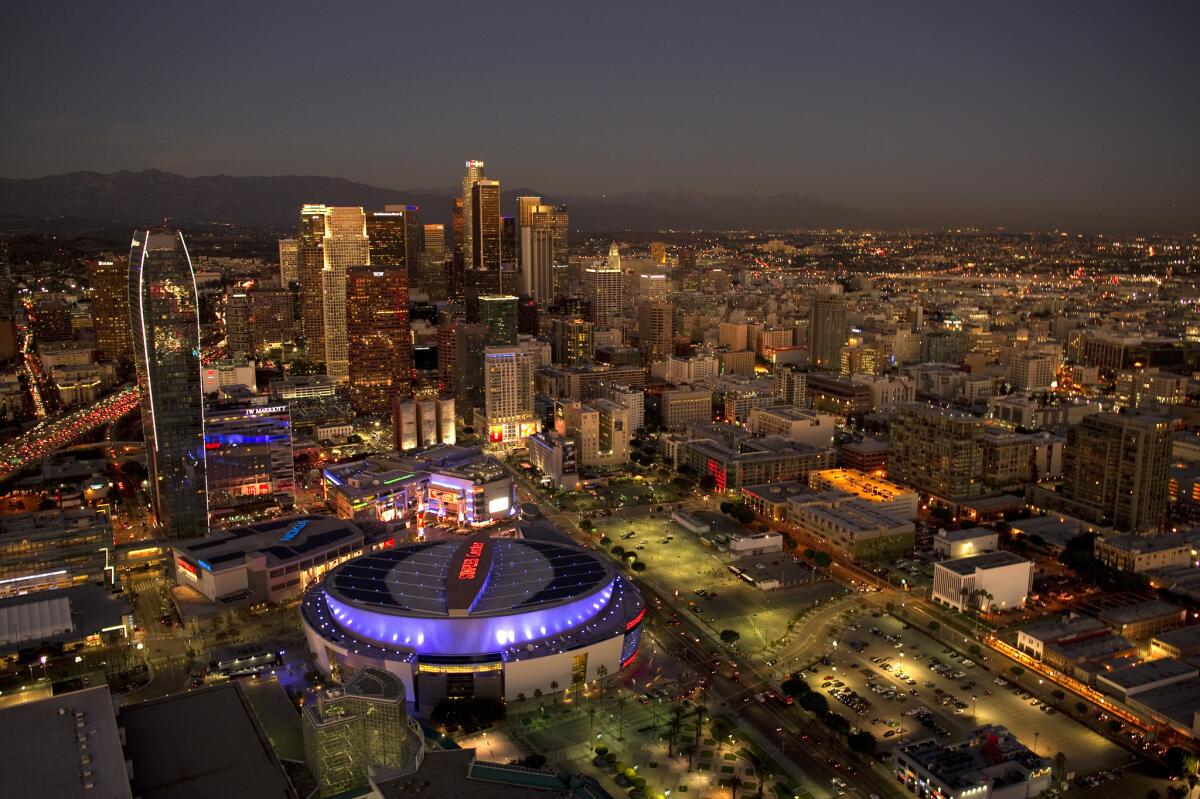L.A. might have been unable to control reasons for losing Olympic bid

- Share via
It was midafternoon Thursday when Mayor Eric Garcetti got the call. The news wasn’t good.
U.S. Olympic Committee executives wanted the mayor to know they had chosen Boston — not Los Angeles — as the American bid city for the 2024 Summer Games.
The mood in Garcetti’s office was gracious, but stunned.
Los Angeles had looked like the frontrunner going into a crucial USOC board meeting in Denver that morning. Chief Executive Scott Blackmun called it a “difficult day. We had some very spirited debate.”
Two other finalists — San Francisco and Washington — were ruled out first. Choosing between Los Angeles and Boston proved tougher.
“It was very close,” said a person familiar with the deliberations but not authorized to speak publicly.
A USOC news conference Friday offered only partial insight into the decision-making process, leaving just as many questions about a selection that caught many by surprise.
“This is nothing new with Olympic bids,” said Robert Livingstone, who follows the Olympic movement for gamesbids.com. “You have to expect the unexpected because you don’t really know what these guys are thinking.”
Although it is impossible to pinpoint a single deciding factor, Boston clearly impressed the board with its emphasis on holding events at the area’s numerous colleges and universities. This proposal aligned with Olympic policy in several ways.
The International Olympic Committee recently adopted reforms that, among other things, seek to make the Games less costly. At the same time, IOC members have traditionally favored cities that build shiny new stadiums.
Though few details have been released, Boston’s plan appears to satisfy these contradictory requirements by having the participating campuses foot much of the construction bill.
That would also guarantee the Games’ “legacy,” which is another way of saying the IOC won’t have to worry about new stadiums and arenas becoming white elephants. Boston’s proposed venues could be used by the respective colleges.
“It was a plan that was athlete-centric, cost-efficient and a plan that harmonized well with the long-term vision of the city of Boston,” USOC Chairman Larry Probst said.
Some 3,000 miles away, Los Angeles officials came up short for reasons that may have been beyond their control.
The city has hosted the Olympics twice before — in 1932 and 1984 — and has an ample supply of venues that range from the historic Coliseum to the relatively new Staples Center and StubHub Center.
Proposing an entirely new set of stadiums and arenas for the 2024 Games would not have made sense, so Los Angeles stuck with its existing infrastructure. There were some previously undisclosed touches:
•Equestrian events, pentathlon, archery, shooting and canoe slalom would have been held in the San Fernando Valley’s Sepulveda Basin.
•Mountain bikers would have raced through Griffith Park.
•The marathon route would have followed Hollywood Boulevard and other iconic streets.
But anchor venues such as the Coliseum, the Rose Bowl and Pauley Pavilion — even if updated — would have represented a second or third go-around for the Games.
Some non-U.S. IOC members quietly resisted the idea of returning to Southern California, even though London recently hosted its third Olympics, said the person familiar with the deliberations.
San Francisco faced a different obstacle. The city’s popularity with IOC members was ultimately outweighed by concerns about fractious local politics.
So Boston Mayor Marty Walsh received a welcome call at his office Thursday.
“I knew that Boston was going to be chosen,” he said. “I just had the feeling.”
Critics of the decision have wondered about the composition of the USOC board. Two members from Los Angeles — Anita DeFrantz and Jim Easton — are also IOC members and get only a quarter-vote.
Of the 11 members with full votes, three live in Boston and two went to college there. But one of those Boston residents also happened to study at USC.
However, Boston has yet to quell a well-organized and vocal opposition group.
On Friday, bid committee Chairman John Fish dismissed “No Boston Olympics” by saying it represents “a very small group of people in our city. As a result of social media, their voice is heard a lot louder.”
Blackmun took a different approach.
“I think the questions that ‘No Boston’ is asking are very fair and very legitimate questions,” the USOC executive said. “We’re open to sitting down with them.”
The USOC also acknowledged that IOC members in other parts of the world might not be as familiar with Boston as they would have been with Los Angeles, San Francisco or Washington.
Blackmun compared the Massachusetts capital to Atlanta, Barcelona and Sochi, all of which have hosted the Games over the last two decades or so.
“We’ve got two years to try to educate, inform and excite the IOC about the city of Boston,” he said. “We think we’re certainly up to the task of informing people about what a great bid this is.”
In the meantime, Los Angeles has no choice but to regroup.
Since 1939, a civic organization called the Southern California Committee for the Olympic Games has worked continually to position the city for future bidding cycles.
The group has prepared numerous proposals over the years, including the most-recent one that was handed over to Garcetti’s office for adjustments last spring. Chairman Barry Sanders said that bouncing back is part of the bid process.
DeFrantz agreed.
“I’m positive that L.A. would have provided a wonderful Games in 2024,” she said. “We’re the one city in the world that remains prepared to host the Games.”
Twitter: @LATimesWharton
More to Read
Go beyond the scoreboard
Get the latest on L.A.'s teams in the daily Sports Report newsletter.
You may occasionally receive promotional content from the Los Angeles Times.











